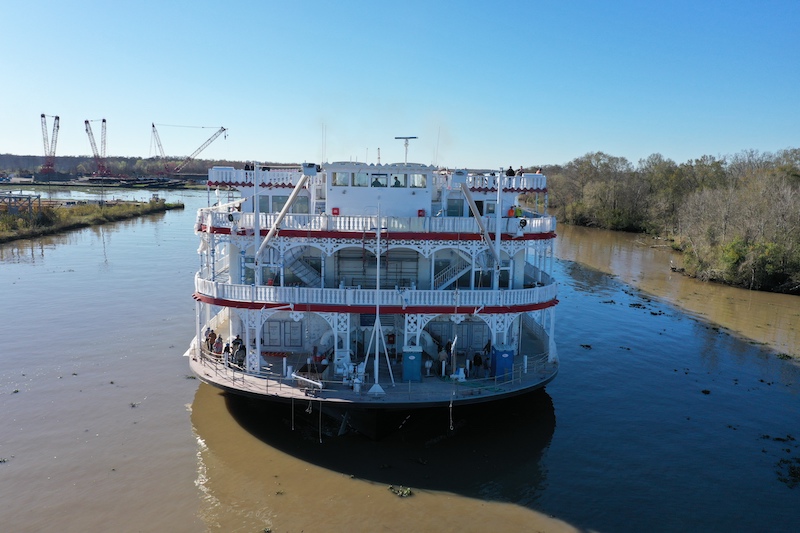U.S.-flag cruise lines are beefing up screenings, adjusting cancellation policies and emphasizing the small size of their ships and close-to-land itineraries in the face of widespread publicity about coronavirus outbreaks on mass market, foreign-flag lines.
The existing challenges were compounded late Sunday by a State Department advisory that travelers with underlying health conditions should avoid cruising, since the Centers for Disease Control (CDC) “notes increased risk of infection of COVID-19 in a cruise ship environment.”
The outbreak threatens to dampen a bright spot in the workboat industry — a robust and steadily expanding domestic river and coastal cruising market.
“The health and safety of our guests and crew is our number one priority and with the pre-screening protocols we have in place, it is our hope that it provides them with peace of mind throughout their journey,” John Waggoner, CEO of the American Queen Steamboat Co., told WorkBoat. “Additionally, our boats are never out of sight of land and with port stops every day, we can have the ability to transport a guest to a U.S. healthcare facility immediately, if needed.”
“Right now it’s an evolving market,” he said. “With current concerns about traveling overseas, we see that more and more travelers will favor staying close to home.”
The New Albany, Ind.-based company said it adopted pre-screening protocols for passengers and crew as of Feb. 14 to “allow for informed decisions on a case-by-case basis as to whether a guest or crew member will be permitted to board.” They also will deny boarding to anyone who traveled from, visited or passed through airports in Italy, Iran, South Korea and China within two weeks before boarding, according to an online notice.
American Queen also has adjusted payment schedules and temporarily revised its cancellation policy. Passengers booked on a 2020 trip may change to another trip this year with no penalties, and the company will pay any flight change fees. While there has been some effect on business, “we remain optimistic about the future and encourage guests to do the same,” Waggoner said.
American Cruise Lines (ACL) said it has implemented coronavirus prevention measures from the Cruise Lines International Association (CLIA) “and we are actively monitoring the situation. We have adopted all current pre-screening measures and have added even more rigorous shipboard sanitation techniques.”
Guilford, Conn.-based ACL, which operates 100- to 200-passenger vessels cruising between domestic ports, is offering passengers on new and existing bookings on cruises leaving March 9 through June 30 the option to cancel for any reason up to 24 hours before their trip and get a voucher for the full amount paid. The vouchers must be used within 12 months of issue.
Tim Jacox, president of UnCruise Adventures, Seattle, said the majority of passengers are sticking with their cruise plans. “The vast number of our guests are discriminating and well-traveled and have traveled with us before,” he said. They’ve had a small number of cancellations, and they’re working with the passengers or agents on a case-by-case basis.
“We are small boats — only 22-86 guests,” he said, and they are U.S.-owned and U.S.-crewed with Alaska as a primary destination.
“At first, we thought it was going to be really bleak, but we’ve not had one cancellation on the U.S. rivers,” said Cindy Anderson, partner at USA River Cruises, a Vancouver, Wash.-based travel agency. “We’ve actually been incredibly busy.” And she’s worried there might not be enough space left to meet demand.
People who had European cruises or were on larger ships are switching to U.S. trips instead, she said. On the plus side of domestic cruising is that the boats go to ports every night so no one’s likely to be stuck on board, and they carry far fewer people than the foreign-flag lines.
Lindblad Expeditions Holdings Inc., which has several new U.S.-flag vessels, said in late February that its “financial performance could be materially impacted” by possibly decreased demand for travel because of the outbreak.
“And we have faced many situations like this before — SARS, terrorism, war, financial crisis. In each instance, there’s a similar pattern: relatively few cancellations, a lull in future bookings — many times plus or minus a month, followed by a robust return to normal. We don’t see why this should be any different,” CEO Sven-Olof Lindblad told analysts.
Even with the coronavirus hovering in the background, bookings for sightseeing cruises out of Seward, Alaska, have been higher than ever.
“Last year we had about 935,000 reservations on the books at this time and now we have 1.1 million,” Tom Tougas, owner of Major Marine Tours in Seward, said in late February. “These are independent passengers that have already paid us for the trips. I’ve been watching it (coronavirus) every day since this whole thing started. You might expect to see a drop-off but every day our reservation center and our online bookings have exceeded the same day a year before.”
Editor's note: Bruce Buls contributed to this report.




